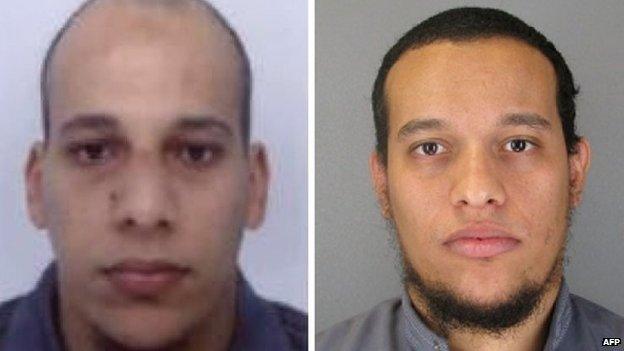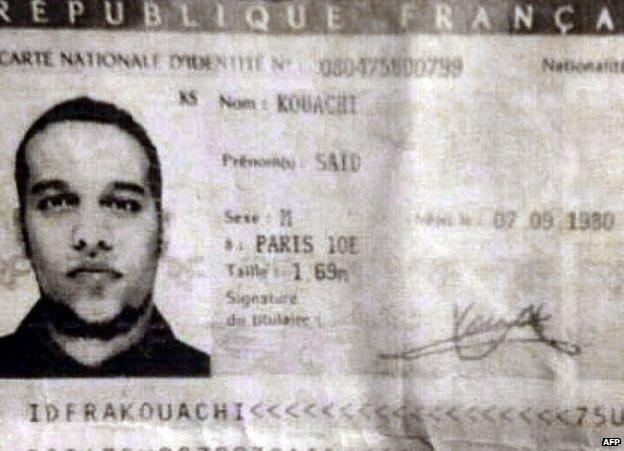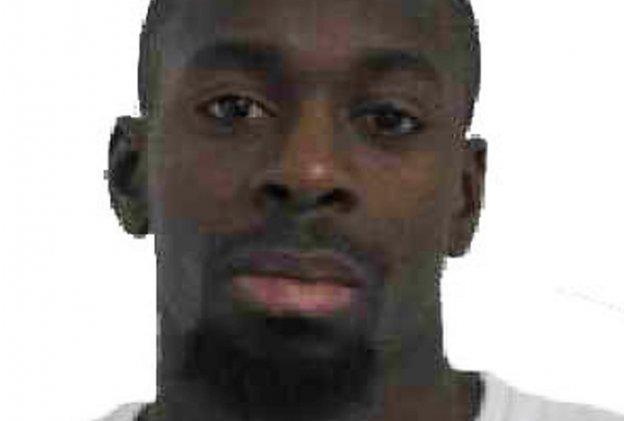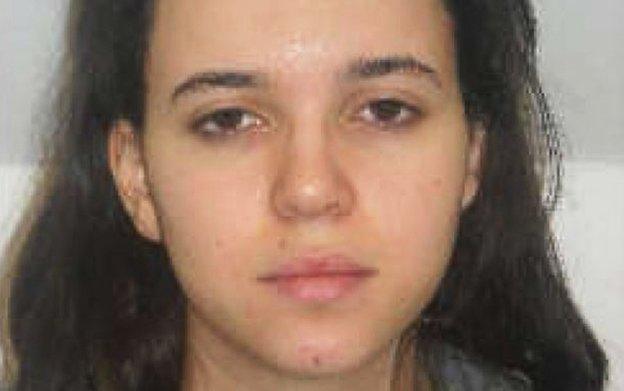Paris attacks: Suspects' profiles
- Published
Police in France have brought to an end two hostage stand-offs, killing three attackers.
In a town north of Paris, the two brothers suspected of carrying out the attack on Charlie Hebdo magazine had been holed up at a printing warehouse. They have now been killed and their hostage freed.
In Paris itself, a gunman holding hostages in a Jewish supermarket has been killed, but a number of hostages also died.
Here is what we know about the attackers so far.

Cherif Kouachi and Said Kouachi

French police released photos of the Kouachi brothers - Cherif (L) and Said (R)
Two brothers accused of carrying out the massacre at the Paris office of satirical magazine Charlie Hebdo on Wednesday were killed two days later when police stormed the building where they had been holding a hostage.
Two men, Said and Cherif Kouachi, had been barricaded in a printing factory in Dammartin-en-Goele, 35km (22 miles) from Paris.
Cherif, 32, was jailed in 2008 and had long been known to police for militant Islamist activities, prior to the attack on Charlie Hebdo's offices, which killed 12 people.
Cherif, who also went by the name Abu Issen, had been part of the "Buttes-Chaumont network" that helped send would-be jihadists to fight for al-Qaeda in Iraq after the US-UK invasion in 2003.
He grew up in an orphanage in the western city of Rennes, where he trained as a fitness coach. In the early 2000s, he joined his elder brother at his home near Paris and worked as a pizza delivery man, media say.
Police detained him in 2005 just as he was about to board a plane for Syria - at the time the gateway for jihadists hoping to fight US troops in Iraq.
Le Monde reports that, external, following Cherif's imprisonment between January 2005 and October 2006, he first came into contact with the man who would become his mentor - Djamel Beghal.
Beghal was sentenced to 10 years in prison in France in 2001 for his part in a plot to bomb the US embassy in Paris.
In 2008, Cherif Kouachi was jailed for three years for his role in sending militants to Iraq, but 18 months of the sentence was suspended.
Eric Bade, a neighbour living in Genneviliers, north-west of Paris, described Cherif as "well-behaved, friendly, polite, clean-looking and above all, which is very important, he was willing to help old and disabled people".
Speaking to the BBC, Mr Bade said Cherif "wasn't aggressive - he wasn't a crazy zealot, he was a calm person".
'Iraq connections'
The brothers had allegedly attended a mosque near the Buttes-Chaumont, an area of northern Paris, where they came under the influence of a radical imam called Farid Benyettou. He reportedly encouraged them to study Islam at his home and at a Muslim centre in their area.
A key figure in the Buttes-Chaumont network was Boubaker al-Hakim, a militant linked to al-Qaeda resistance against US forces in Iraq, a French expert on Islamists says.
A French court jailed Hakim for seven years in 2008, at the same time as Cherif, along with Farid Benyettou, who got six years. That action broke up the jihadist network they had created.
In a blog article (in French), external Middle East expert Jean-Pierre Filiu says Hakim had recruited militants to fight in Falluja, an Iraqi city that became an al-Qaeda stronghold in 2004.
Hakim is also wanted in Tunisia over the murder of two Tunisian left-wing opposition politicians in 2013 - Chokri Belaid and Mohamed Brahmi. Hakim claimed the murder in the name of the Islamic State militant group, Mr Filiu says.
In 2010 Cherif Kouachi was named in connection with a plot to spring another Islamist, Smain Ait Ali Belkacem, from jail - a plot hatched by Beghal, according to French anti-terror police.
Belkacem used to be in the outlawed Algerian Islamic Armed Group (GIA) and was jailed for life in 2002 for a Paris metro station bombing in 1995 which injured 30 people.
Said Kouachi, 34, was also named in the Belkacem plot, but the brothers were not prosecuted because of a lack of evidence.
Said's ID card was found in the brothers' getaway car which they abandoned after the Charlie Hebdo shooting, police sources say.

A photocopy of Said's ID card, allegedly found by police in the car abandoned after the Charlie Hebdo attack

Amedy Coulibaly

The gunman who is thought to have killed four people and held a number of others hostage at a Jewish supermarket in eastern Paris has been identified as 32-year-old Amedy Coulibaly.
Police also believe he killed a policewoman in the Montrouge area of the French capital on Thursday.
Coulibaly is believed to have had a long history of criminal activity - including drugs offences - and links to at least one of the Kouachi brothers.
Born in Juvisy-sur-Orge on the outskirts of Paris, he is said to have been one of 10 children. He worked for Coca Cola.
He met then-President Nicolas Sarkozy at the Elysee Palace in 2009, as part of an employment initiative.
In an interview with Le Parisien, external at the time, he said it would be "impressive" to meet Mr Sarkozy, and that he was not sure what he would say.
He had added that his temporary job at the local Coca Cola plant would be over soon, and that he hoped Mr Sarkozy could help him get a job.
Reports say Coulibaly - along with Cherif Kouachi - was a committed follower of Djamel Beghal.
In 2013 he was jailed for five years for his involvement in the 2010 plot to free Smain Ait Ali Belkacem from prison, following the militant Islamist's conviction over the 1995 Paris metro station bombing.
He met Cherif Kouachi while in prison.
Coulibaly was released last year.
He is said to have told police from the supermarket on Friday: "You know who I am."
An acquaintance told AP news agency that he was "totally shocked" when he found out about Coulibaly's role in the attacks.
"He never went to prayers or talked about Islam," the fellow drug dealer, who spoke on condition of anonymity, said.
Coulibaly's mother and sister have issued a statement condemning his attacks.
They offered "sincere condolences" to the families of the victims, and said: "We absolutely do not share these extreme ideas. We hope there will not be any confusion between these odious acts and the Muslim religion."

Hayat Boumeddiene

Meanwhile, police are still trying to trace Hayat Boumeddiene, a 26-year-old woman who was Coulibaly's partner.
She is thought to have married Coulibaly in a religious ceremony in 2009 - however, these ceremonies are not recognised in France unless an official civil ceremony is also carried out.
She is now believed to be in Syria. She arrived in Turkey in early January, before crossing into Syria on 8 January, Turkish Foreign Minister Mevlut Cavusoglu said on 12 January.
Police had previously identified her as a suspect in Thursday's shooting of a policewoman.
Francois Molins, the chief prosecutor in France, said Boumeddiene had exchanged more than 500 phone calls with the wife of Cherif Kouachi in 2014.
French newspaper Le Monde published a series of photographs, external said to show Coulibaly with Boumeddiene in 2010. In one, she is pictured pointing a crossbow at the camera while wearing a full-face veil, which is banned in France.
Police questioned Boumeddiene about Coulibaly in 2010. During the interview, she was reportedly asked about her reaction to attacks by al-Qaeda, and responded: "I don't have any opinion", before blaming the US for civilian deaths.